KitchenAid Go Cordless Hand Blender two-minute review
The KitchenAid brand needs little to no introduction, but the concept of battery-powered kitchen appliances like the KitchenAid Go Cordless Hand Blender might be unfamiliar to many people.
The beauty of the KitchenAid Go range of appliances is that they all use the same removable, swappable battery. This means if you invest in several appliances from the range they can share batteries, so you can save some cash and buy some of them without a battery included.
The KitchenAid Go Cordless Hand Blender is designed to be used just like any other hand blender. But because it doesn’t need to be near a power outlet, you have a lot more freedom to blend soups on the stove or blitz a fruit puree on the dining table, something you'd struggle to do with any of the best blenders.
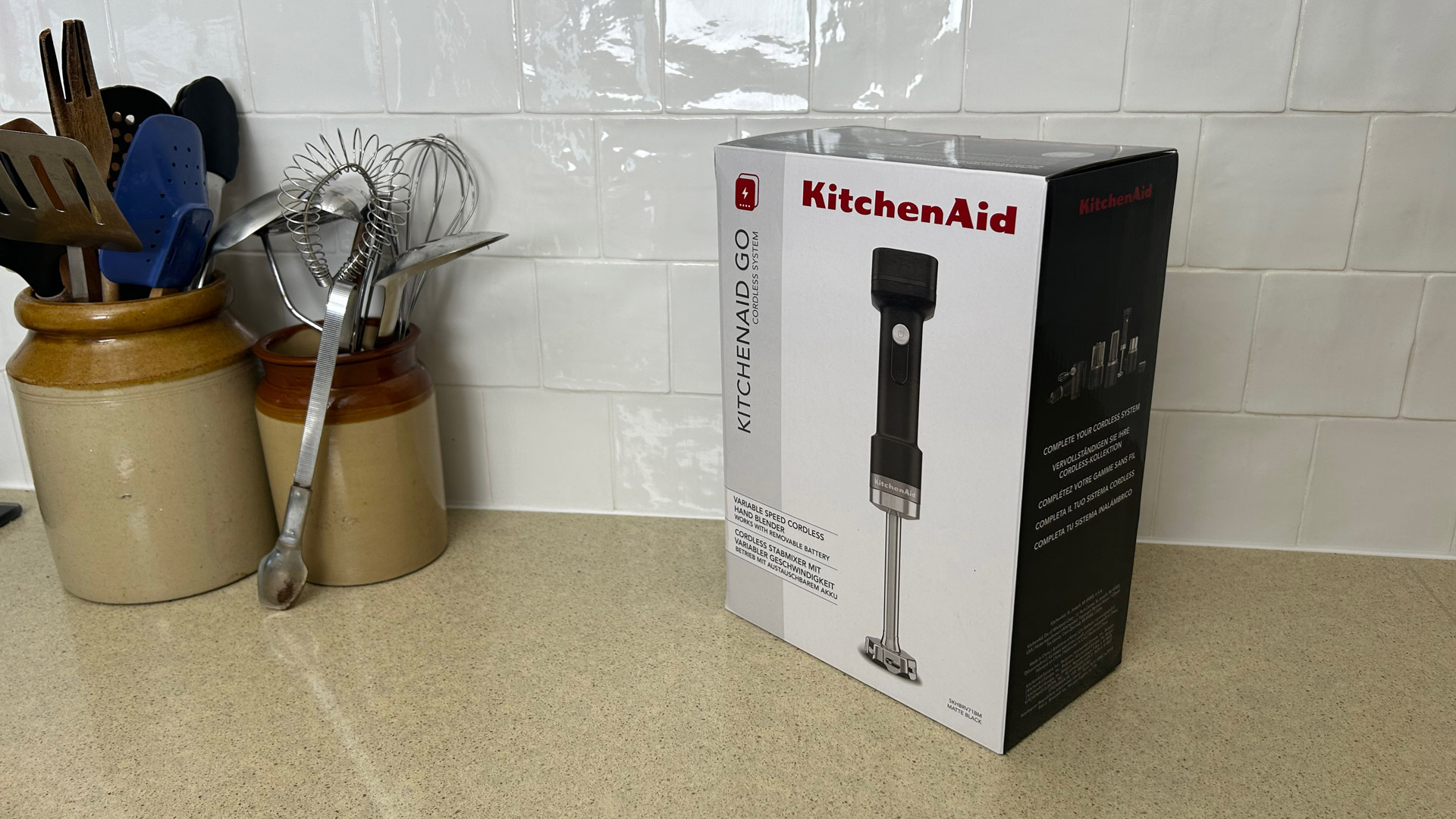
On test it certainly proved it was up to the job, creating smooth soups, milkshakes, and pureed vegetables. But I did manage to break the pan guard on the first use, which was a bit of a negative. You can read more about that in the performance section below.
Overall though, I found it easy and comfortable to use. And if you get frustrated by the lack of available power outlets in your kitchen, it could be a game-changer.
KitchenAid Go Cordless Hand Blender review: price & availability
- List price: US$129.99 / £179 / AU$268
- Availability: US / UK / AUS
The KitchenAid Go Cordless Hand Blender is currently available in the US, UK and Australia. It can be purchased directly from KitchenAid.
It’s available with or without the battery. The prices above are for the model that includes a battery. Without a battery it’s around $30/ £30 / $69 cheaper at $99.99 / £149 / AU$199.
It’s important to point out that while KitchenAid does sell the compatible battery as a standalone accessory, it costs $49.99/ £69 / AU$69. Therefore if you're in the US or UK it's always cheaper to buy the appliance with the battery bundled in.
Being cord-free does come with a premium price tag. A standard variable speed corded hand blender from KitchenAid will cost significantly less at around $60/ £109.
Whether or not a cordless hand blender is worth the additional investment does depend on your individual budget as well as your kitchen setup. But for many people it does solve a frustrating problem of working around the position of power outlets.
Discounts are sometimes available, so if the premium price tag is a sticking point for you, it’s worth keeping an eye out for a discount. For example at the time of writing there was a $10 reduction on the hand blender on the US KitchenAid website.
- Value for money score: 4 out of 5
KitchenAid Go Cordless Hand Blender review: design
- Built-in safety feature
- Well balanced
- Straightforward controls
The main hand blender features a removable blending arm with a stainless steel blade. This twists easily onto the main body of the blender. At the very top of the body, above where you hold it, is where the battery attaches.
The blender dimensions when assembled, including the battery are: 16 x 2.8 x 3.1" / 40.5 x 7 x 7.9cm (h x w x d). The weight is 1.9lbs / 880g which will feel weighty for some people, but it’s pretty well balanced so that the weight is distributed down through the blender and not into your arm.
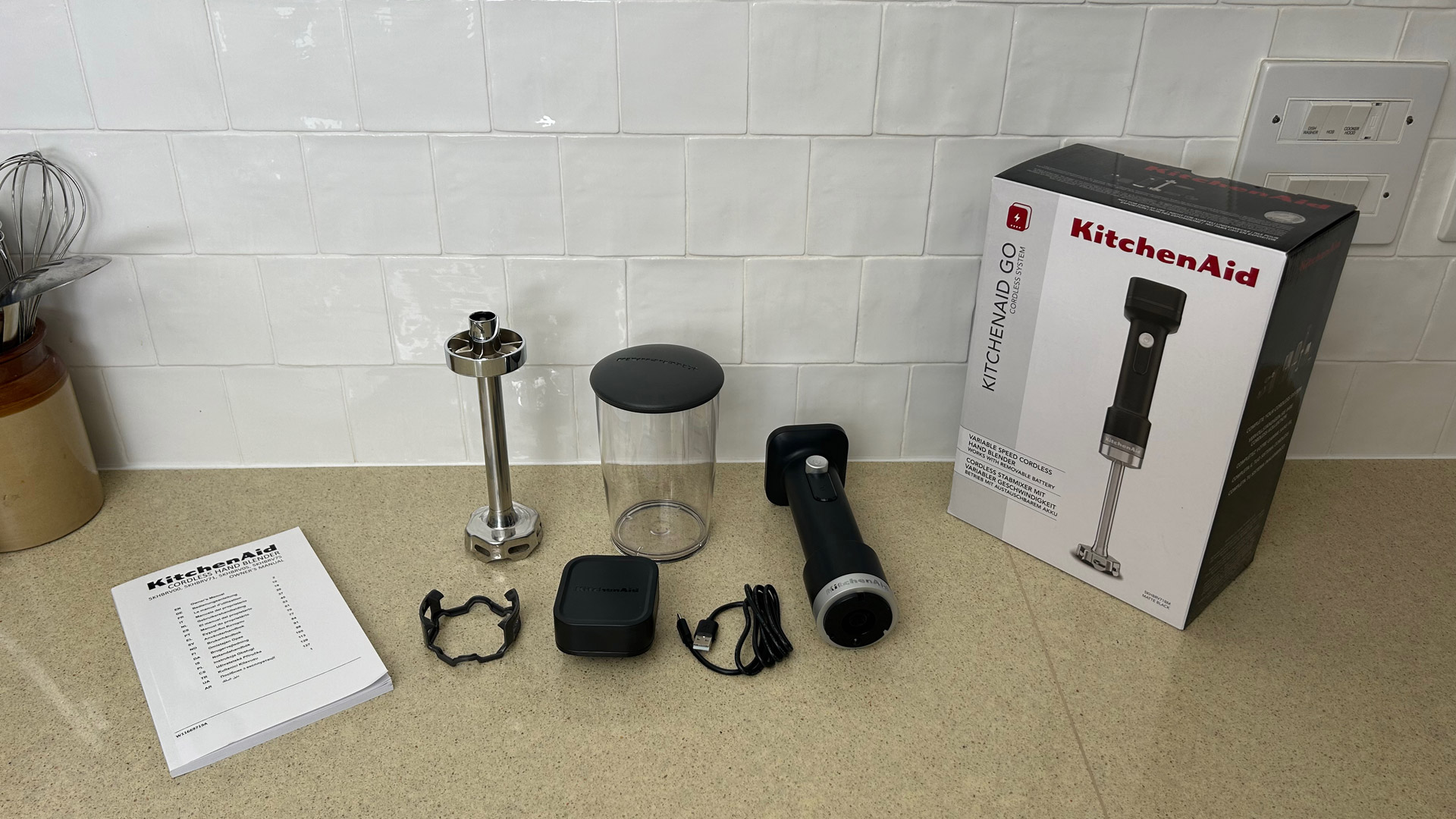
As well as the main hand blender, in the box there’s also a 23.6oz / 700ml BPA free blending jar, with a handy lid, so you can easily store your creations in the fridge. There's also a plastic pan guard that clips onto the end of the blender to avoid damaging pans if you’re blending something directly in a non-stick pan.
There’s one main power button and the firmer it’s pressed, the higher the blending speed. However, the blender won’t work unless the unlock button beneath it is pressed simultaneously. At first this can feel like a bit of pain, but you soon get used to it and it’s a great safety feature - something that’s often lacking with hand blenders.
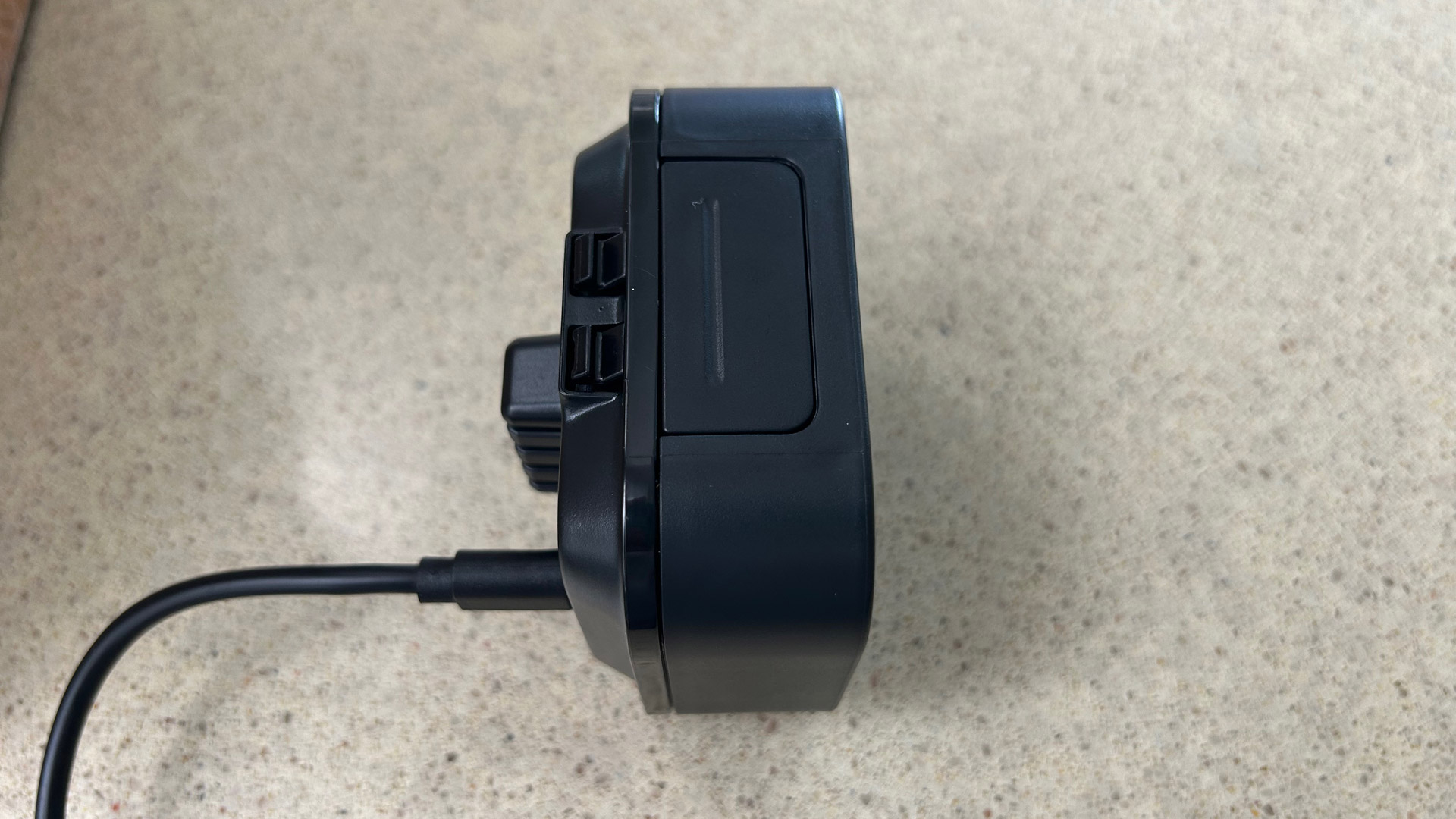
The removable battery comes with a USB charging cable, but no plug, so you’ll have to supply your own or buy the separate charging dock for $29.99 / £29. The battery itself features four small lights that each represent 25% power. So by pressing a button on the side of the battery, you can get a rough idea of how much power is left depending on how many lights illuminate.
- Design score: 4.5 out of 5
KitchenAid Go Cordless Hand Blender review: performance
- Speedy blending
- Comfortable to use
- Good battery life
For my first try with the KitchenAid Go Cordless Hand Blender I made a protein shake. I added 8oz milk, a sliced banana, a scoop of protein powder and a heaped teaspoon of peanut butter to the blending jar and blended until it appeared smooth.
I stopped blending after 40 seconds and the drink was well mixed and pretty smooth. There was still a slight graininess so it wasn’t as smooth as if I'd made it in a high powered blender, but it was a pleasant texture nonetheless.
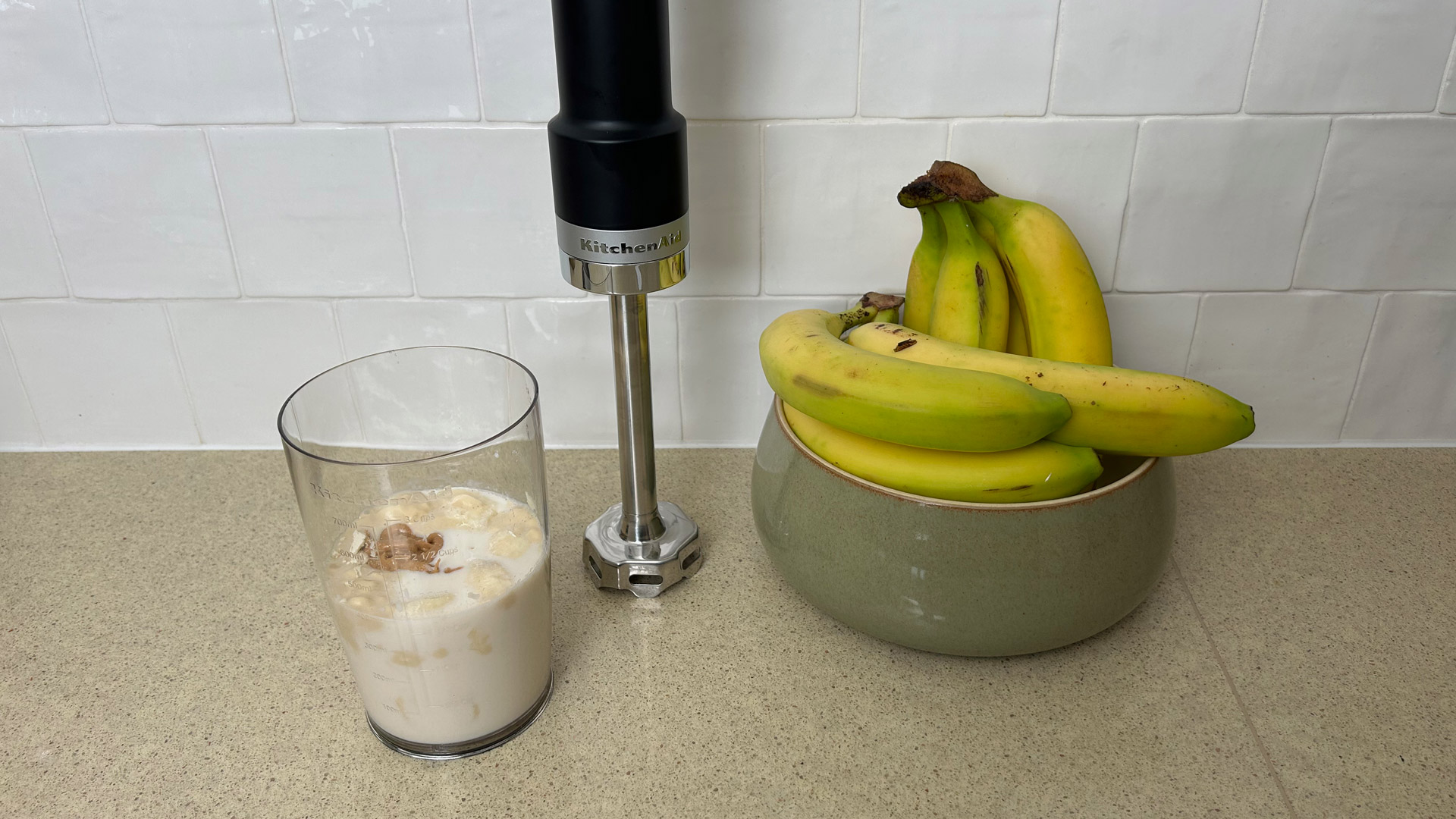
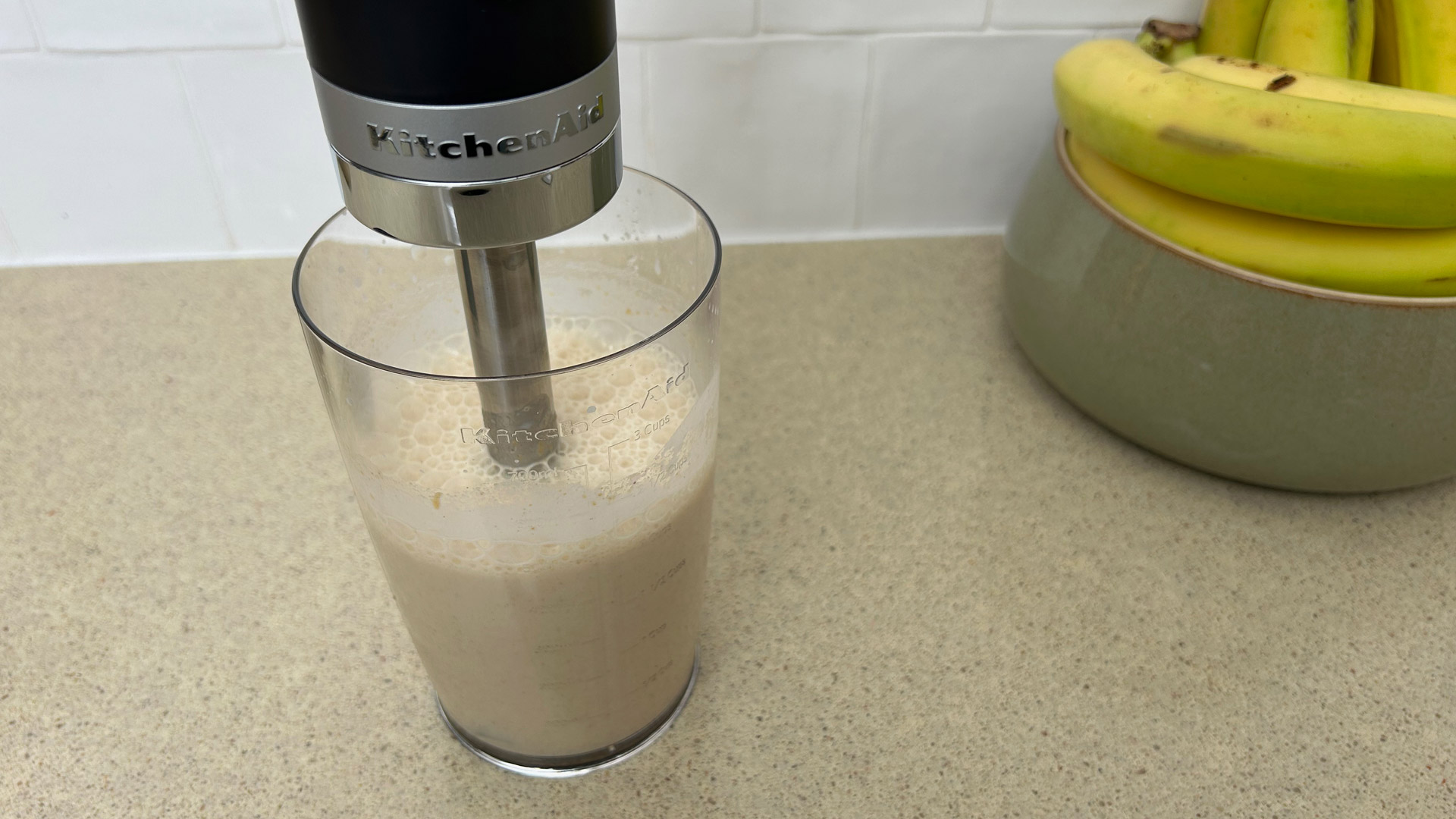
I tested the noise level when blending the protein shake and it hit 94dB on my noise meter, which is pretty loud and equivalent to a motorcycle at 50ft. But I must admit that I didn't think it was loud during use, I’ve certainly used louder hand blenders over my years of kitchen appliance testing.
I was concerned that with the battery on top, the hand blender might feel weighty or unbalanced, but thankfully that wasn’t the case. I actually found it very comfortable to use.
To test out its ability to puree I used it to make pureed potatoes. Now, to clarify, this is essentially a mash potato, but when you blitz the cooked potato with a hand blender it creates more of a silky puree texture than a fluffy mash.
This is where I had a bit of a mishap. I’d attached the pan guard so that I could puree the hot, freshly cooked potatoes in the pan. However, during blending I heard a funny noise and when I checked, the pan protector had come off and subsequently been chopped by the blade.

While I am pretty certain I had attached it correctly, I can’t say for definite whether it was the thick gloopiness of the potato puree that dislodged it, or incorrect installation. Either way though, I would urge you to exercise caution when using it in thicker foods. And it was disappointing to break it on the first use.
After retrieving all the broken plastic, I carried on pureeing the potatoes, which took around 90 seconds in total for a small pan of potatoes. I wouldn’t advise using this method for a big batch of potatoes though.
Next time I used it in a pan, I had to do so without the broken pan guard. This time, I was blitzing a homemade pea and mint soup. This task was a breeze for the hand blender and the soup was smooth after just 2 minutes of blending.
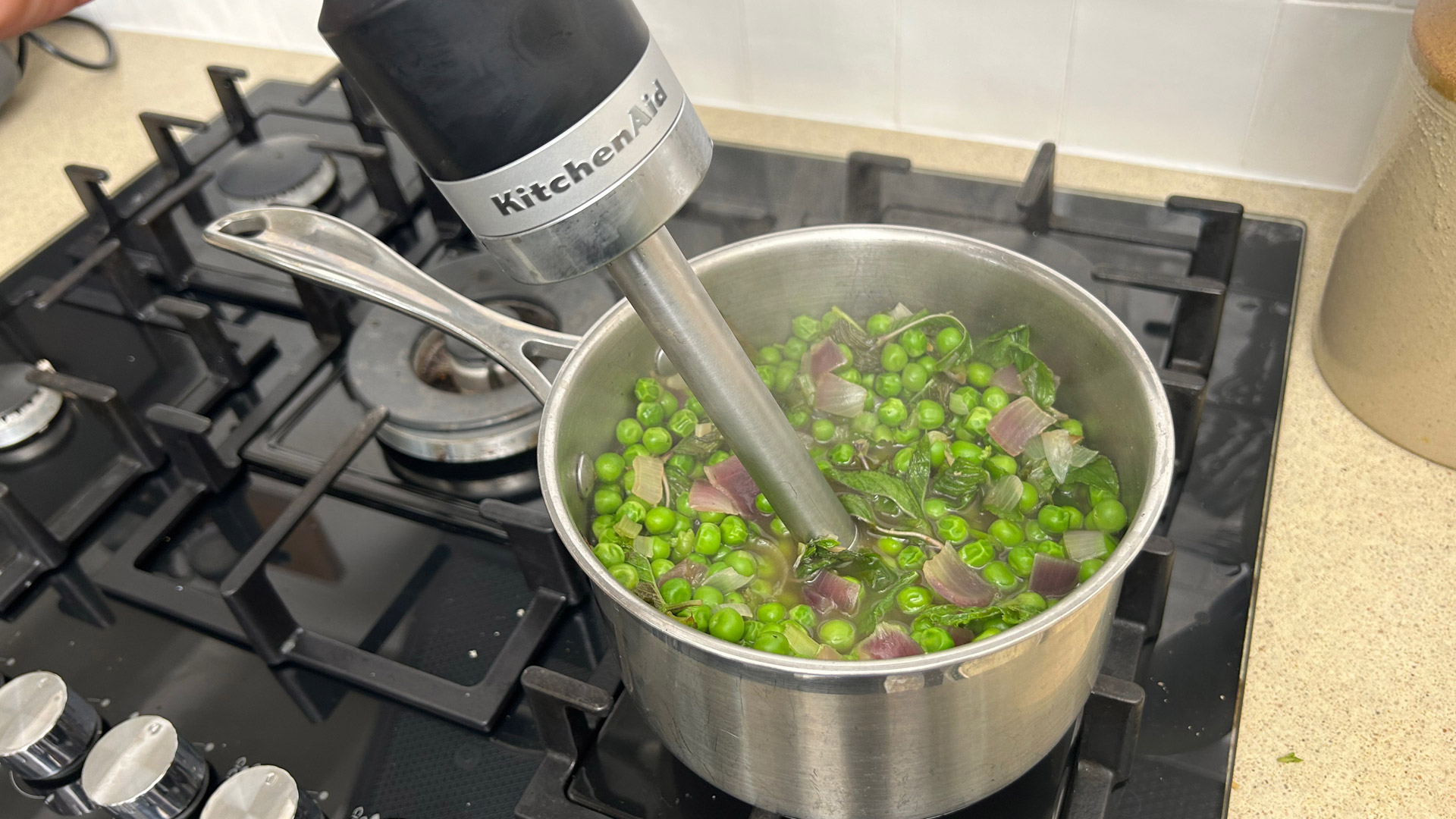
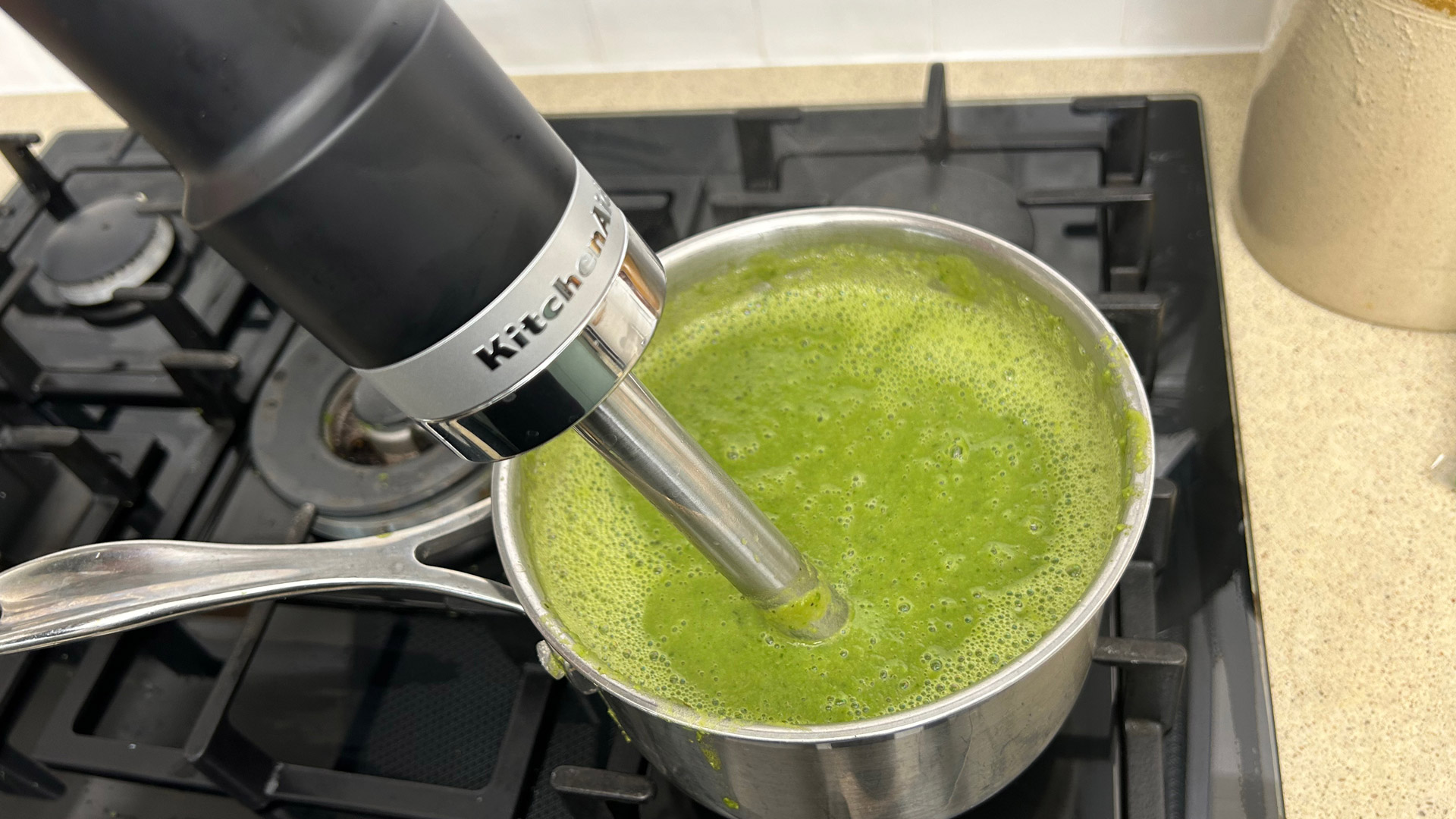
The variable speed button does noticeably increase the blending speed the firmer it’s pressed. But to be honest, I found that I naturally tended to press it all the way in and had to really think about loosening my grip for a slower speed.
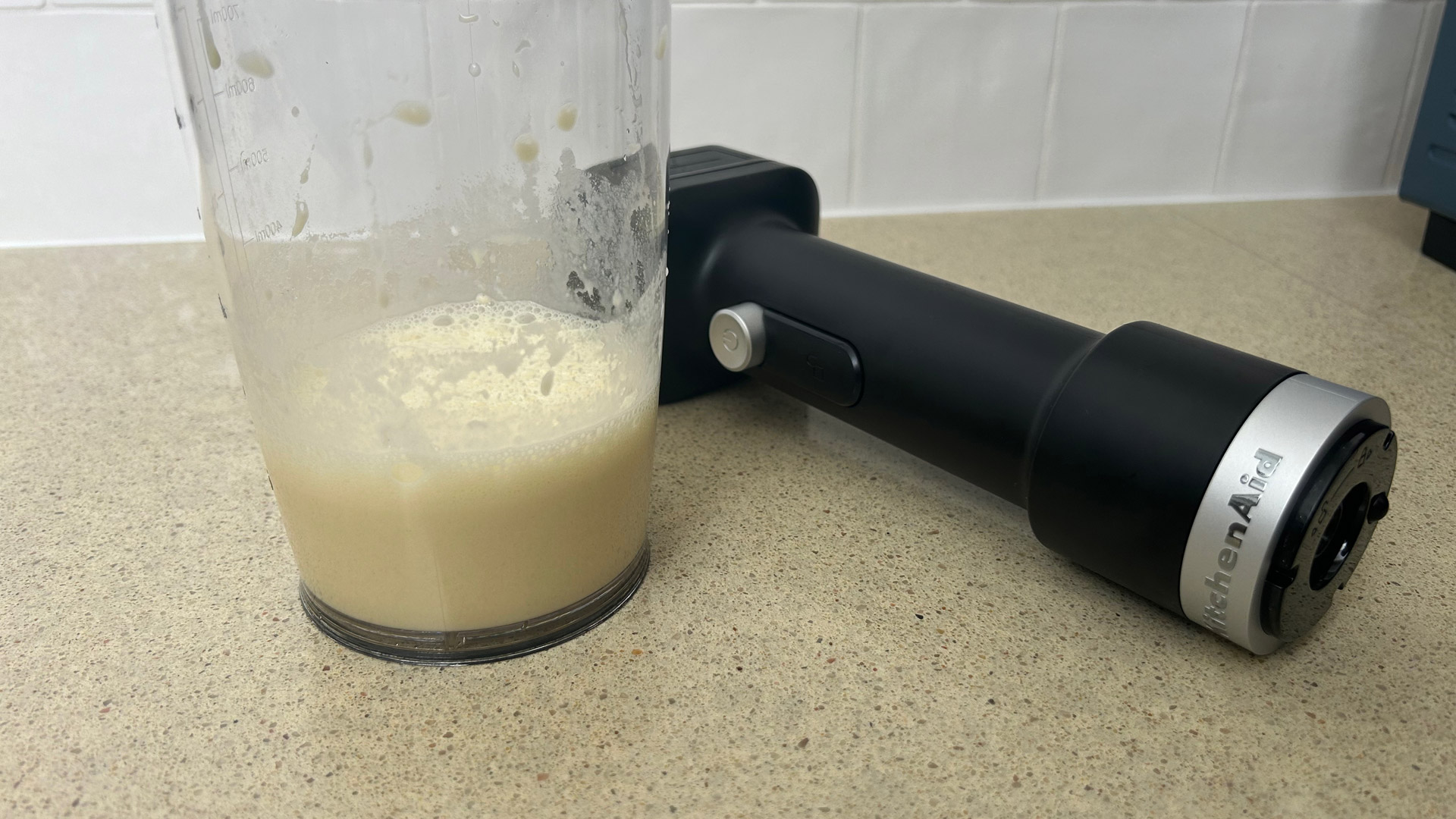
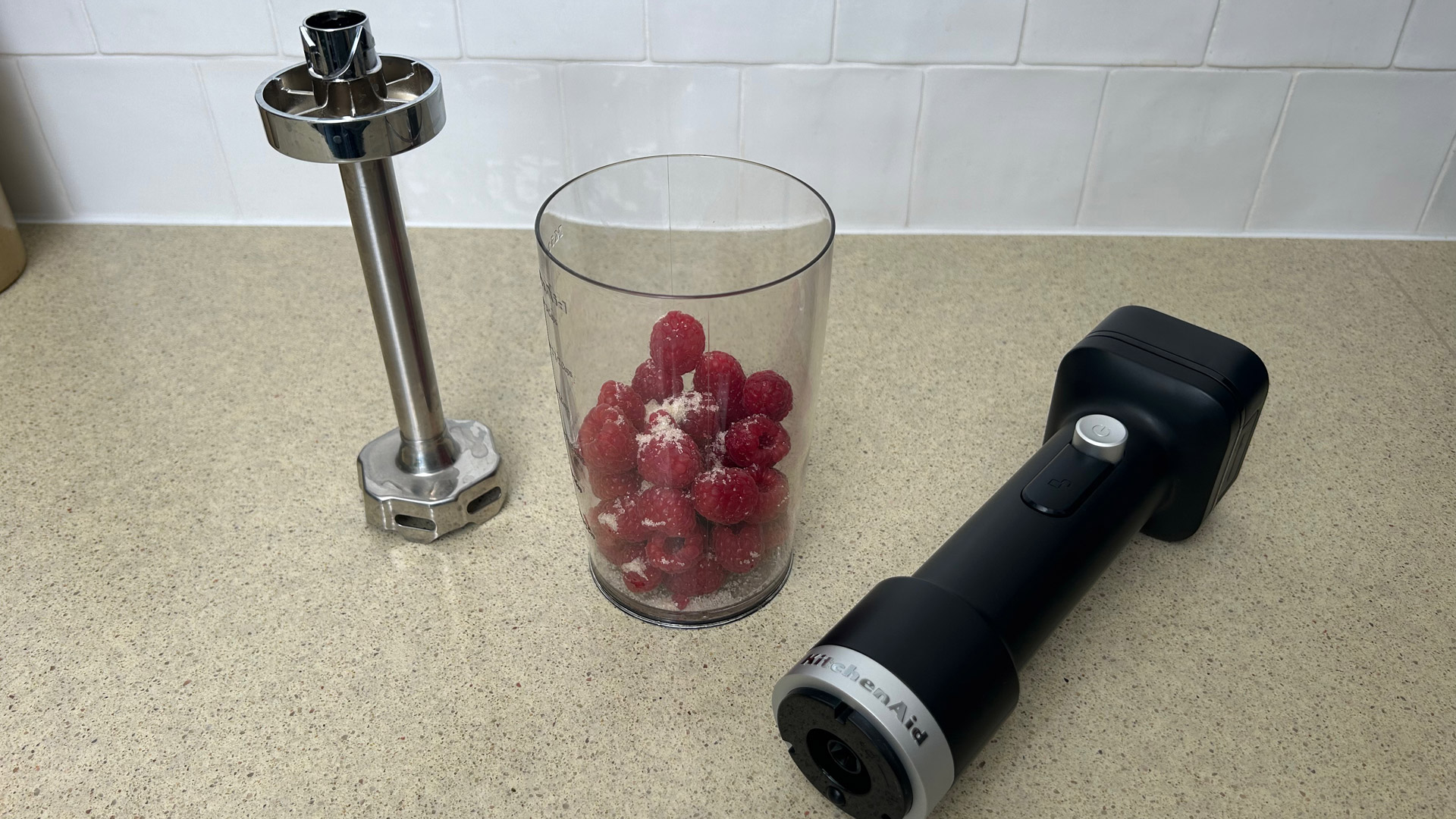
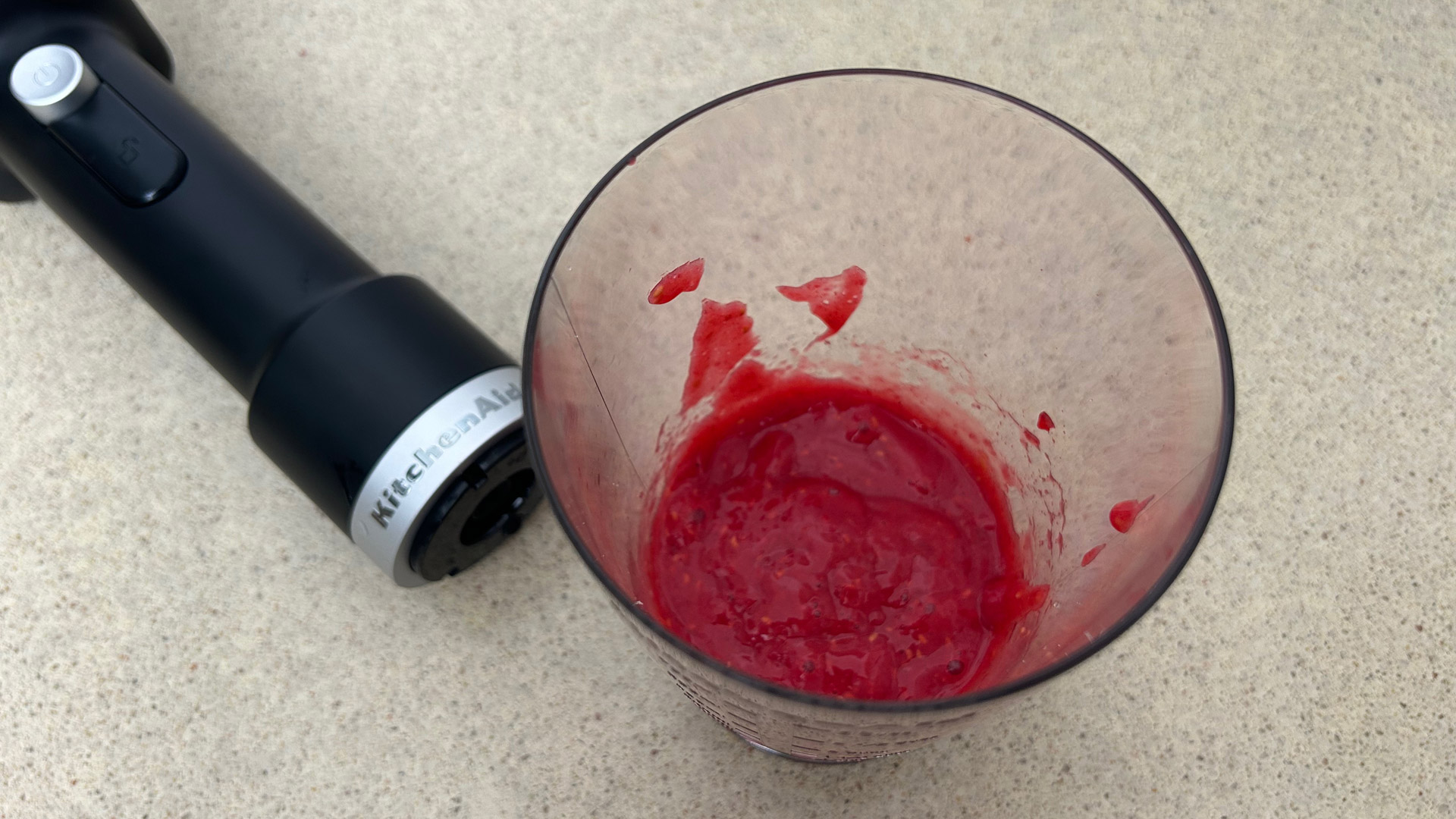
Pancake batter was no match for this hand blender. In just 15 seconds my egg, milk, and flour were combined into a lump free batter. Similarly, 6.6oz of fresh raspberries were liquified in just 20 seconds. The seeds weren’t pulverized, but I’d have been very surprised if they were.
The battery takes around three hours to charge. But after all of the above tests it still showed 75% power on the battery level indicator lights. I had to use it for a further 6 minutes at full speed before the battery level was drained to 50%. It’s encouraging to know I could use it for several blending tasks and not need to recharge it too often.
The main blade is the only part that can’t go in the dishwasher. But on the whole, as long as I rinsed it immediately after use, it came clean very easily. The blending cup, lid, and pan guard can all go in the dishwasher. That said, none of it is too tricky to wash by hand either.
- Performance score: 4 out of 5
Should you buy the KitchenAid Go Cordless Hand Blender?
Buy it if…
You want to blend at the stove
Trailing power cables across your stovetop to reach into a pan of hot soup is dangerous from a number of perspectives. So if you want to blend soups and sauces on the stove, a battery operated hand blender is the answer.
You want an in-built safety feature
Having to press a safety lock button in order for the main power button to work might not seem like a big deal, but if you’ve got small children around, this added step is an important one when dealing with sharp blades.
You don’t have space for a full size blender
A hand blender is a great compromise for a smaller kitchen. You can still blend soups, sauces, and shakes, but you don’t have to find space for a massive blender.
Don't buy it if…
You’re looking for the best value for money
Just a glance at the price should tell you this isn’t the one for you if you’re on a budget. If that’s the case, opt for a corded hand blender and you’ll get much more bang for your buck.
You don’t have the best hand or finger dexterity
Holding in two buttons to operate the hand blender might be a great safety feature, but not everyone has the hand or finger mobility to allow this. If you suffer with hand or finger mobility issues it might not be the model for you.
You won’t remember to charge the battery
A cordless appliance relies on you periodically checking and charging the battery. If you’re likely to forget about it, you’ll kick yourself when you come to use it and there's no charge left. In this case a corded model might be a better option.
How I tested the KitchenAid Go Cordless Hand Blender
I set up the KitchenAid Go Cordless Hand Blender in my own kitchen at my house. I used it several times for a variety of foods, including soup, pancake batter, protein shakes, pureeing potatoes, and pureeing raspberries.
I used it in hot food in a pan as well as for smaller volumes in the supplied blending cup. During this time, I was paying attention to the ease and comfort of use, as well as any issues or problems that arose. I also kept an eye on the battery to see how quickly it was drained.
Read more about how we test
First reviewed July 2024



0 Comments